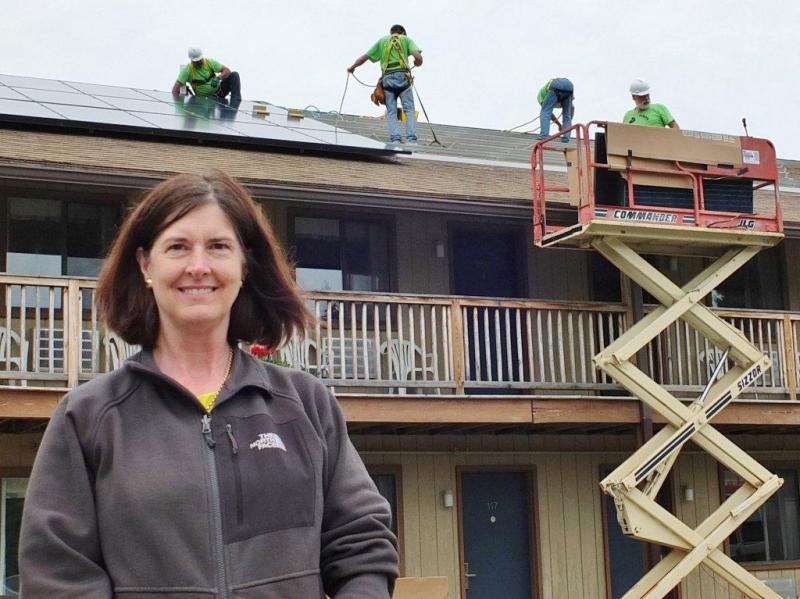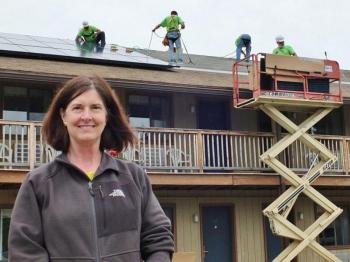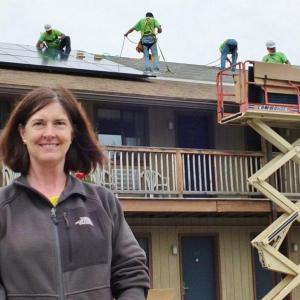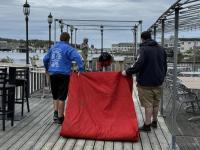Hotels become solar hotspots
 Ann (Robinson) Goggin of Goggin Energy oversees the solar panel installation at Boothbay Harbor's Flagship Inn on June 13. Goggin's solar panels convert direct current from the sun into alternating current right at the solar panel. The panels will offset the Flagship's electricity bill starting July 1.
Ann (Robinson) Goggin of Goggin Energy oversees the solar panel installation at Boothbay Harbor's Flagship Inn on June 13. Goggin's solar panels convert direct current from the sun into alternating current right at the solar panel. The panels will offset the Flagship's electricity bill starting July 1.
 Ann (Robinson) Goggin of Goggin Energy oversees the solar panel installation at Boothbay Harbor's Flagship Inn on June 13. Goggin's solar panels convert direct current from the sun into alternating current right at the solar panel. The panels will offset the Flagship's electricity bill starting July 1.
Ann (Robinson) Goggin of Goggin Energy oversees the solar panel installation at Boothbay Harbor's Flagship Inn on June 13. Goggin's solar panels convert direct current from the sun into alternating current right at the solar panel. The panels will offset the Flagship's electricity bill starting July 1.
During the hottest months of summer, the Flagship Inn and Brown's Wharf Inn will be powered by the sun.
One hundred and eight solar panels were mounted to the rooftop of the Flagship Inn on June 13. The solar panels are rated to last up to 35 years, and can withstand hail stones being hurled at 50 mph.
“Every solar panel that goes up means less electricity generated by fracking of natural gas, or oil, or nuclear (power),” said Goggin Energy owner Ann Goggin. “We really want to see the Boothbay Pilot Project succeed because then we can show the utilities that we don't need to spend billions of dollars upgrading transmission wires.
“We can bring the power supply and management closer to the people who are using it,” Goggin said.
On the east side of Boothbay Harbor, 120 solar panels will be installed on Brown's Wharf Inn by late June. Oyster Creek Electric, who was hired to install the panels has already replaced over 600 incandescent and florescent light bulbs with high efficiency LED lightbulbs.
Other hotels participating in the project are the Tugboat Inn, Fisherman's Wharf Inn and Boothbay Harbor Inn. The hotels are currently undergoing LED installations, while solar panels will be installed on the Tugboat Inn and the Boothbay Harbor Inn in October.
The efforts are part of the Boothbay Pilot Project, a three-year experiment sponsored by GridSolar to provide alternative electricity to the region. The project aims to reduce the strain on power lines during the hottest summer months, while avoiding building new power lines down the Route 27 corridor. Central Maine Power estimated new lines would have cost $18 million.
In October of 2012, GridSolar awarded bids to Goggin Energy, ReVision Energy, Oyster Creek Electric, Heliotropic Technologies and Boothbay Microgrid to install energy efficient systems at a reduced cost to commercial and residential properties around the region.
But the project was delayed when Boothbay Microgrid withdrew their bid in May. That delay forced GridSolar to seek a second round of proposals.
Local businesses and residences have until July 31, 2013 to submit proposals to be considered for the project.
First round drawback
Michael Mayhew, who owns Heliotropic Technologies in Boothbay Harbor, was granted a general contract in the first round of bids.
Mayhew said part of his work is to install LED light bulbs in local hotels, restaurants and art galleries as part of the Efficiency Maine Lighting reduction project. The other part of his work is solar panel installation. “It's a great concept, and it is working all over the place, but the problem is timing,” Mayhew said.
Since the Maine Public Utilities Commission didn't officially approve the solar panel contract until May 28, Mayhew said it's going to be difficult to meet the July 1 operating deadline without incurring a penalty.
If Mayhew has not fulfilled his 60 kw of solar electricity specified in the contract by July 1, he will be subject to fine equivalent to the amount of diesel generation it takes to offset the delayed project.
Another inconvenience for Mayhew is that the first round bids are now public information, so the second round applicants will be able to see what bids were awarded and at what price they sold for, giving second round bidders better insight at a much lower risk, Mayhew said.
“My competitive advantage, because they're sending this back out to bid, is a bit of a detriment,” Mayhew said. “It's definitely skewed the marketplace.”
But according to Goggin, with the loss of Boothbay Microgrid, the second round of bids will afford more people the chance to get involved in the project at a time when equipment and installation costs are at an all time low.
Goggins said without the subsidies currently offered by GridSolar and CMP, residential customers typically have a 10-12 year payback. “In residential solar systems, in three to four years, you pay for it; for the next 21 to 35 years you get power for no cost.
“It will not happen again in our lifetimes in the Boothbay region,” Goggin said. “It's a win for the environment, it's a win for the economy, it's a win for people's financial security.”
Goggin estimated the average cost for residential solar panel installations run from $12,000-$15,000. By participating in the Boothbay Pilot Project, homeowners are eligible for a federal tax credit, a possible state rebate and 36 months of payment from CMP for producing energy and putting it back into the grid.
Goggin started her Portland-based business 12 years ago as a real estate developer, but moved into solar energy because of a moral commitment to help businesses and households become more sustainable. Goggin is also a graduate of the Boothbay Region High School class of 1975. (She was known as Ann Robinson then.)
Event Date
Address
United States























